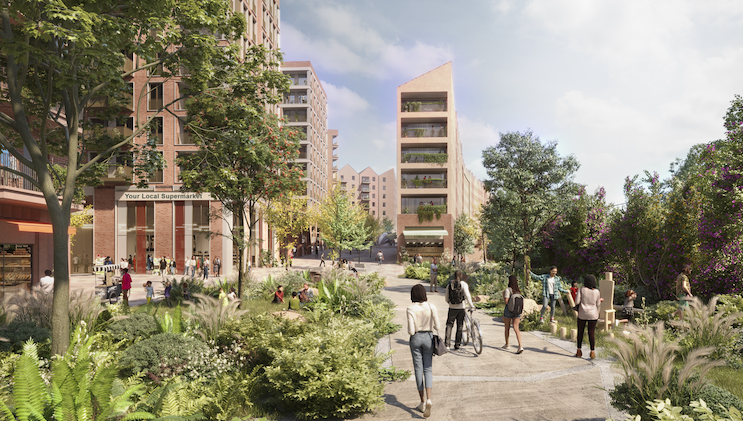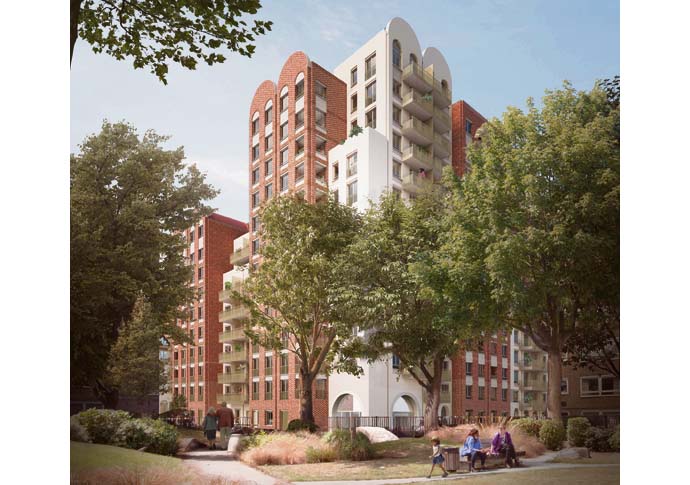Estate plan demolition green light
Bulldozers set to move in for Church Street 1,200-home regeneration
Friday, 31st March 2023 — By Tom Foot

Artist’s impression
BULLDOZERS are set to smash down one of Westminster’s largest housing estates, in the middle of the climate crisis, after councillors waved through another major demolition scheme.
Councillors on the planning committee heard from three speakers in support of its own 1,200-home regeneration of Church Street estate and surrounding public realm, but no opponents spoke at the meeting.
A ballot on the estate earlier this year found 30 per cent did not want the scheme, which was first announced in 2010, to go ahead.
Tenants will now be told to move out of hundreds of homes in Broadley Street, Penfold Street, Church Street and Edgware Road. All have been given the right to return to new homes when they are built.
In the first phase of works, 428 homes are to be built in towers ranging from eight to 14 storeys tall.
Tuesday’s planning meeting kicked off with a discussion about whether councillors could justify knocking down so many buildings instead of the greener option of refurbishment.
Cllr Ruth Bush, the chair of the committee, said: “We are increasingly aware of the seriousness of the loss of embodied carbon and other things associated with demolition. I’d like to ask members whether they are content with that principle. Has enough been done to warrant the demolition of all these buildings?”
Councillors Jason Williams, Nafsika Butler-Thalassis, Paul Fisher, Mark Shearer and Ed Pitt Ford all agreed the project’s good outweighed the bad after hearing an officer’s presentation.
The officer said: “The biggest question here is why retention was not considered and there is a full demolition. We have to recognise the scale of demolition and the overall harm of losing existing resources.”

The first phase of the Church Street regeneration was given approval, with all councillors voting in favour: above, an artist’s vision for Broadley Gardens
She said the buildings in Church Street could not be retrofitted because of the number of homes proposed by the city council’s planning application. Contractors would aim to recycle the existing blocks, concrete, piles and foundations, she added.
The council in 2021 launched a policy that said that the “retention, repair and sensitive retrofit of Westminster’s historic buildings has a powerful role to play in the fight against climate change”, and noted: “By conserving our historic buildings, we eliminate the need for carbon emissions associated with new-build and reduce waste by recycling and reusing existing materials.”
Bizarrely, the council will have to make a carbon payment of £375k to itself because of the failure to satisfy clear air ambitions.
Opponents of the scheme have criticised the loss of light and the impact from years of construction blight on residents who remain on the estate while its blocks are knocked down.
Speaking in favour of the scheme at the start of the meeting, a father-of-eight told the committee how desperate he was for a bigger home. He said: “I have been a social resident of Church Street for 14 years. I live with my wife and eight children in a four bedroom flat. I have problems with lack of space and privacy.
“My children are of various ages and have no space to study. They are sharing rooms and with only one toilet between us. We have excessive mould and damp. We are all sitting in a blanket in the living room. I live on the top floor and there are 54 stairs. My home is not ready for the future.”
Also speaking in favour, the council’s head of development in her speech suggested Church Street would become “a place of choices and chances, connections between past and future, a sense of community and excitement for what could be better”.
Alan Sterling, chair of Church Street Neighbourhood Forum, had backed the scheme, saying: “There have been differences of opinion. But now we know the plans are finalised, we are keen to see the works start.”
He praised the decision to launch an estate-wide ballot, which took place last winter, and which enabled the council to secure an extra £30million for the Church Street scheme that the council said would provide “higher levels of truly affordable housing”.
The first phase of the Church Street regeneration was approved with all the councillors voting in favour of the scheme. An agreement in principle for the redevelopment of Church Street market and the rest of the estate was also agreed.